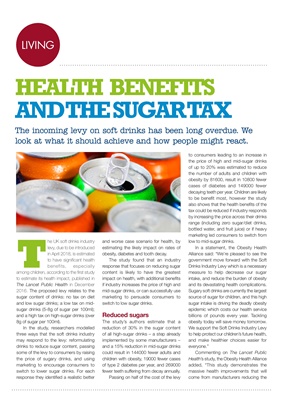
LIVINGLIVING
The incoming levy on soft drinks has been long overdue. We
look at what it should achieve and how people might react.
HEALTH BENEFITS
AND THE SUGAR TAX
The UK soft drinks industry
levy, due to be introduced
in April 2018, is estimated
to have significant health
benefits, especially
among children, according to the first study
to estimate its health impact, published in
The Lancet Public Health in December
2016. The proposed levy relates to the
sugar content of drinks: no tax on diet
and low sugar drinks; a low tax on midsugar drinks (5-8g of sugar per 100ml);
and a high tax on high-sugar drinks (over
8g of sugar per 100ml).
In the study, researchers modelled
three ways that the soft drinks industry
may respond to the levy: reformulating
drinks to reduce sugar content, passing
some of the levy to consumers by raising
the price of sugary drinks, and using
marketing to encourage consumers to
switch to lower sugar drinks. For each
response they identified a realistic better
and worse case scenario for health, by
estimating the likely impact on rates of
obesity, diabetes and tooth decay.
The study found that an industry
response that focuses on reducing sugar
content is likely to have the greatest
impact on health, with additional benefits
if industry increases the price of high and
mid-sugar drinks, or can successfully use
marketing to persuade consumers to
switch to low sugar drinks.
Reduced sugars
The study's authors estimate that a
reduction of 30% in the sugar content
of all high-sugar drinks - a step already
implemented by some manufacturers -
and a 15% reduction in mid-sugar drinks
could result in 144000 fewer adults and
children with obesity, 19000 fewer cases
of type 2 diabetes per year, and 269000
fewer teeth suffering from decay annually.
Passing on half of the cost of the levy
to consumers leading to an increase in
the price of high and mid-sugar drinks
of up to 20% was estimated to reduce
the number of adults and children with
obesity by 81600, result in 10800 fewer
cases of diabetes and 149000 fewer
decaying teeth per year. Children are likely
to be benefit most, however the study
also shows that the health benefits of the
tax could be reduced if industry responds
by increasing the price across their drinks
range (including zero sugar/diet drinks,
bottled water, and fruit juice) or if heavy
marketing led consumers to switch from
low to mid-sugar drinks.
In a statement, the Obesity Health
Alliance said: "We're pleased to see the
government move forward with the Soft
Drinks Industry Levy which is a necessary
measure to help decrease our sugar
intake, and reduce the burden of obesity
and its devastating health complications.
Sugary soft drinks are currently the largest
source of sugar for children, and this high
sugar intake is driving the deadly obesity
epidemic which costs our health service
billions of pounds every year. Tackling
obesity today will save money tomorrow.
We support the Soft Drinks Industry Levy
to help protect our children's future health,
and make healthier choices easier for
everyone."
Commenting on The Lancet Public
Health's study, the Obesity Health Alliance
added, "This study demonstrates the
massive health improvements that will
come from manufacturers reducing the